Related Research Articles

Mohandas Karamchand Gandhi was an Indian lawyer, anti-colonial nationalist and political ethicist who employed nonviolent resistance to lead the successful campaign for India's independence from British rule. He inspired movements for civil rights and freedom across the world. The honorific Mahātmā, first applied to him in South Africa in 1914, is now used throughout the world.
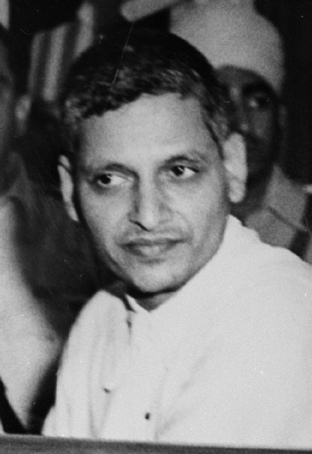
Nathuram Vinayak Godse was the assassin of Mahatma Gandhi. He was a Hindu nationalist from Maharashtra who shot Gandhi in the chest three times at point blank range at a multi-faith prayer meeting in Birla House in New Delhi on 30 January 1948.
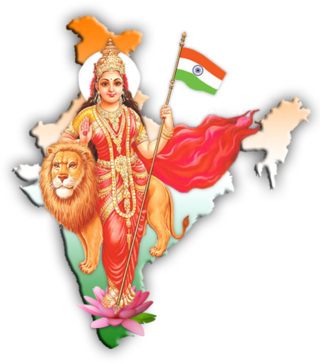
Bhārat Mātā is a national personification of India (Bharat) as a mother goddess. In the visual arts she is commonly depicted dressed in a red or saffron-coloured sari and holding a national flag; she sometimes stands on a lotus and is accompanied by a lion.
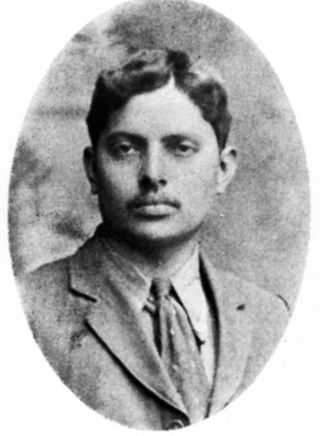
Harilal Mohandas Gandhi was the eldest son of Mahatma Gandhi and Kasturba Gandhi. He had three younger brothers: Manilal Gandhi, Ramdas Gandhi and Devdas Gandhi.

Rajmohan Gandhi is an Indian biographer, historian, and research professor at the Center for South Asian and Middle Eastern Studies, University of Illinois at Urbana-Champaign, US. His paternal grandfather is Mahatma Gandhi, and his maternal grandfather is Chakravarthi Rajagopalachari. He is also a scholar in residence at the Indian Institute of Technology Gandhinagar.

Gandhi Jayanti is an event celebrated in India to mark the birthday of Mahatma Gandhi. It is celebrated annually on 2 October, and is one of the three national holidays of India. The UN General Assembly announced on 15 June 2007 that it adopted a resolution which declared that 2 October will be celebrated as the International Day of Non-Violence as he was a non-violent freedom fighter. He is also known as the "Father of The Nation" and this title was given to him by Netaji Subhash Chandra Bose for his relentless struggles for independence.
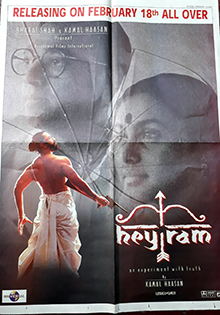
Hey Ram is a 2000 Indian period crime drama film written, directed and produced by Kamal Haasan, It was simultaneously made in Tamil and Hindi languages. The film's soundtrack and score were composed by Ilaiyaraaja. It is an alternate history film that depicts India's Partition and the assassination of Mahatma Gandhi by Nathuram Godse. The Hindi version was distributed by Khan's Dreamz Unlimited.
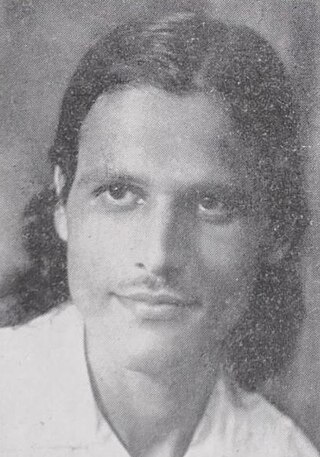
Kavi Pradeep, was an Indian poet and songwriter who is best known for his patriotic song "Aye Mere Watan Ke Logo" written as a tribute to the soldiers who had died defending the country during the Sino-Indian War.
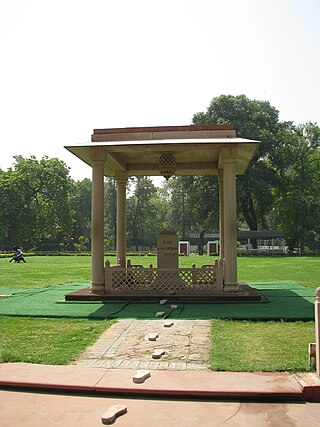
Mahatma Gandhi was assassinated on 30 January 1948 at age 78 in the compound of Birla House, a large mansion in central New Delhi. His assassin was Nathuram Godse, a Chitpavan Brahmin from Pune, Maharashtra, a Hindu nationalist, a member of the Rashtriya Swayamsevak Sangh (RSS), a right-wing Hindu paramilitary organization as well as a member of the Hindu Mahasabha. Godse considered Gandhi to have been too accommodating to Pakistan during the Partition of India of the previous year.

Jagriti is a 1954 Indian Hindi-language film directed by Satyen Bose. It was based on the 1949 Bengali film Paribartan that Bose had also directed. The film stars Rajkumar Gupta, Abhi Bhattacharya, and Ratan Kumar in the lead roles. The film won the Filmfare Award for Best Film at the 3rd Filmfare Awards in 1956. Bhattacharya received the Filmfare Award for Best Supporting Actor for his outstanding performance in Jagriti at the same ceremony. Jagriti still considered one of the best children-centric films of India.
Lage Raho Munna Bhai is a 2006 Indian Hindi-language satirical comedy drama film written, edited and directed by Rajkumar Hirani, who co-wrote the screenplay with Abhijat Joshi and produced by Vidhu Vinod Chopra. It is the follow-up to the 2003 film Munna Bhai M.B.B.S. with Sanjay Dutt and Arshad Warsi reprising their roles as Munna Bhai, a Mumbai underworld don, and his sidekick, Circuit, respectively. Vidya Balan portrays the female lead, replacing Gracy Singh from the original, while several other actors from the first film, notably Jimmy Sheirgill and Boman Irani, appear in new roles. In Lage Raho Munna Bhai, the eponymous lead character starts to see the spirit of Mahatma Gandhi. Through his interactions with Gandhi, he begins to practice what he refers to as Gandhigiri to help ordinary people solve their problems.
"Raghupati Raghava Raja Ram" is a bhajan widely popularised by Mahatma Gandhi and set to tune by Vishnu Digambar Paluskar in Raga Mishra Gara.
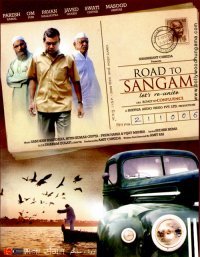
Road to Sangam is a 2010 Bollywood film written and directed by Amit Rai. The film features Bollywood actors Paresh Rawal, Om Puri and Pawan Malhotra.

Tanguturi Suryakumari, also known by her married name Suryakumari Elvin, was an Indian singer, actress and dancer in Telugu cinema. She sang "Maa Telugu Thalliki", the official song of the State of Andhra Pradesh. She was the winner of Miss Madras 1952 pageant and runner-up of the Miss India 1952 pageant. She was the niece of activist and politician Tanguturi Prakasam Pantulu, who served as the first chief minister of Andhra state and previously as the chief minister of Madras.
Kanu Gandhi was an Indian photographer. He was a grandnephew of Mahatma Gandhi who lived with him in several of his ashrams and was a member of his personal staff. He is best remembered as Gandhi's photographer, recording many moments of Gandhi's life on film from 1938 until his assassination in 1948. Following Gandhi's death, Kanu and his wife Abha moved to Rajkot where they ran a rural centre named after Kasturba Gandhi. Abha was one of the companions with Gandhi at Birla House Delhi, when Godse shot Gandhi.
Welcome Back Gandhi is a 2012 Indian film directed by A. Balakrishnan. The film, released on 30 January 2012 in India, stars S. Kanagaraj as Mohandas Gandhi. The movie's music was written by Ilaiyaraaja, with lyrics by Bharat Acharya, and the movie's plot explores how Gandhi might react if he was still alive and visited modern day India. An eight-song soundtrack is set to be released shortly after the film's debut.
Ratan Kumar was the screen name of the Indian born child artist who later migrated to Pakistan. He acted in Indian & Pakistani movies. He was born as Syed Nazir Ali Rizvi. He is best known for his work in films Boot Polish (1954), Do Bigha Zamin (1953) and Jagriti (1954).

Mahatma Gandhi Marg is the main pedestrian road located in the downtown Gangtok, Sikkim.
References
- ↑ Pramod Kumar Sharma (14 March 2014). Mahatma a Scientist of the Intuitively Obvious. Partridge Publishing. p. 9. ISBN 9781482819236.
- ↑ "Driving home a point through songs". The Hindu . 4 October 2008.
- ↑ Shyamhari Chakra (3 October 2007). "Tributes through songs". The Hindu.
- ↑ Vijay Lokapally (13 June 2009). "Jagriti 1954". The Hindu.